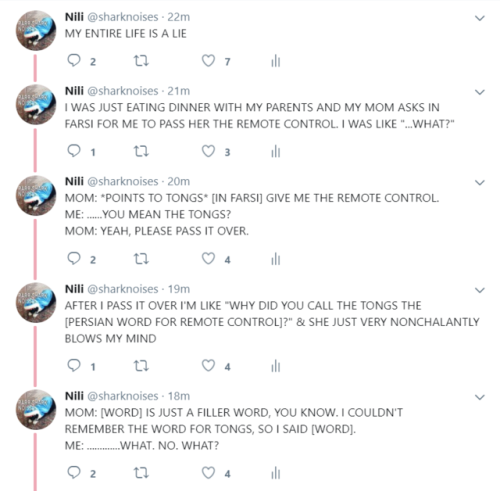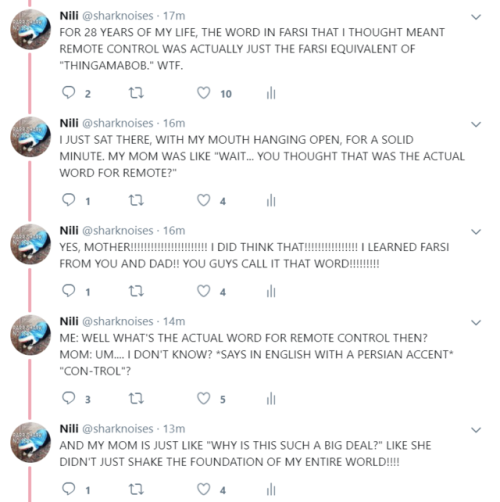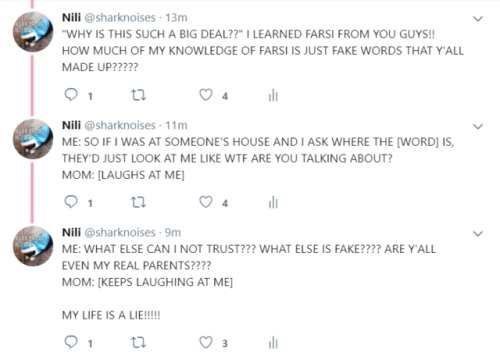If You Read This Post You Are Contractually Obligated To Say One (1) Good Thing About Yourself. No Self
If you read this post you are contractually obligated to say one (1) good thing about yourself. No self depreciation.
More Posts from Flaneurarbiter and Others

UN:MASKED 4 - ELIZAVETA PORODINA
Me, trying to figure out how to say my name, but it's late so: tommorrow problem.
This is still so cool though
Updated: Kishite-Shabalic Script and a bit of the Kishic Language: Basics including an expanded list of nouns and verbs
I made this before but looking through it again I missed some things and made some mistakes, and so here is an updated version of this for y'all! As with the Kishite spoken language, the Kishic script descends from and is largely identical to the Shabalic script, thus the term Kishite-Shabalic. Kishite-Syllabic is one of three scripts used in Kishetal along with Kishic hieroglyphs (reserved for religious/cultic purposes) and the logographic Shetalic script, which has fallen almost entirely out of favour.

The Kishite-Shabalic script is syllabic, thus each symbol is representative of one syllable composed of a consonant and a vowel. In addition there are characters which serve as punctuation used to symbolize the conclusion of a thought, in similar fashion to the Latin "." and "?", and the presence of a proper noun or divine status. Though it should be noted that these are not always actually used.
Unlike the Shetalic script which is traditional formed using styluses pressed into clay, Kishite-Shabalic is typical written either through carving or the use of charcoal/ink.
Shetalic is shown below on the left with Kishite-Shabalic on the right, both say the same thing.

Keep reading for more linguistic babbling!
Vowels
As a general rule when transcribing the Kishite script, when two of the same vowel are put next to one another, they are treated as a single vowel, rather than elongated as we might see in English with words like book or meet or feat. Two different vowels, such as O and E, E and A, and so on, are almost never put directly beside each other. In the rare instances when this does occur the "stronger" of the two vowels will cover the other. The order of strength from least to greatest is as follows:
i-e-a-o-u
The vowels of the Kishite language are pronounced phonetically
Thus:
I as in sweet or pin
E as in egg
A as in palm
O as in coat
U as in tool
e.g. the substantive adjective "the Mighty" Urjali- + -ul (substantive ending) Urjaliul Urjaliul Urjalul (OOr-Jahl-OOl)

Special Note: One important differentiation between the Shabalic language and the Kishite language is that the Kishite language allows for the placing of multiple consonants in sequence. Take for example the Kishic name Ninma, in its original Shabalic form it would be Ninama (NI-NA-MA). Because of the fact that Kishite does have this trait, it has developed its own unique form of punctuation, the vowel drop. When placed below one of the syllabograms shown above, it cancels out the vowel, in essence rendering it mute. Ninma could alternatively be spelled using the formulation NI-IN-MA, similar to how Narul was spelled above, this is largely a matter of personal preference. The more traditional (Shabalic) form is often times considered more in keeping with nobility.

Sentence Structure
The Kishic language primarily follows a subject-object-verb structure.
Naru(u)l Nina(a)ma kimagiga(a)s Narul Ninma kimagigas. Narul Ninma carried. Narul carried Ninma.
Tamel kim(u)unur fabiguta(a)s Tamel kimunur fabigutas Tamel gates broke. Tamel broke gates.
Otilya (there is no -ia symbol in Kishite) Korithub luku ga. Otilya Korithub luku ga Otilia Korithia from is. Otilia is from Korithia
Enni Wi tuba chi Jahubur horu jawishaga The wind down the Mountain hard blows. The wind blows hard down the mountain.
Noun and Adjective Declensions
The Kishic language system consists of the following cases: nominative, genitive, dative, accusative, and possessive (the Shabalic language includes an instrumental case), and distinguishes between two numbers (singular and plural) and four genders, Masc/Neutral (undefined groups or individuals), Feminine, Inanimate, and Divine.
Divine beings such as gods and certain spirits as well as the Sun, Mountains, Rivers, and the Sea are always referred to in the Divine gender. Some monsters also fall under this category. (Water Bi (Inanimate), Lake Bi (Divine))
Objects which are not and have never been alive are rendered in the Inanimate gender. This can get confusing in some instances, for example while the word corpse Nahoku would utilize the masc/neutral form, the word bone, hashudi, would utilize the inanimate. Another example of this is the word Oli which can mean either blood or wine based on whether it utilizes masc/neut or inanimate declensions.
Not all inanimate objects are rendered into the inanimate. Words like spear shukala use the masc/neutral. This group typically consists of weapons and tools. The stem used will depend on the root word.
Plants as a rule are always rendered into the feminine.
Cities and countries are neutral.
Royal Titles have a specific declension.
A few examples of declension are given in the tables below.







Sample Verbs
Verb stems always end with -i. The exception to this is the verb to be, which rather takes the form of the conjugation, thus the first person singular indicative present sample or "am" would be wa.
Talk: Akki
Breathe: Ki
Eat: Ushki
Struggle: Nari
Sleep: Eshsi
Fight: Orishri
Hunt: Pabakazi (Literally Bow art(ing))
Dance: Irteti
Kiss: Mishuzi
Copulate (and the more vulgar equivalent): Seshiti/Tu(u)ki
More verbs will be provided below.
Verbal Conjugation
There are two conjugation groups within Kishite verbs, the ha/za/hi-conjugation and the wa/ya/wi-conjugation. Which conjugation is used is dependent on the verb in question, typically words with a Shabalic root use the wa -conjugation while words derived from native languages more often use the ha -conjugation.
Within the Kishite language there are two voices (active and medio-passive), three moods (indicative, subjunctive, and imperative), three aspects (perfective, imperfective/continuous, and simple), and three tenses (Past, Present, and Future)
The present tense can be identified by -i/-a/-u/-o, past by -as/-os/-us, and future by -ad/-id.
Indicative: Used for Stating facts and thus the mood of reality.
Active: The Subject is the agent of the verb.
Mediopassive: The agent acts as a reflexive agent of the verb (acting upon itself) OR the subject is the target of the verb.
Present Simple Active: Narul is hungry Past Simple Active: Narul was hungry Future Simple Active: Ninma will not be hungry Present Simple Mediopassive: Narul is accompanied by Ninma/ Narul cleans (himself). Past Simple Mediopassive: Narul was accompanied by Suru Future Simple Mediopassive: Narul will be accompanied by Mikrab Present Perfect Active: Narul has slept Past Perfect Active: Narul had slept Future Perfect Active: Narul will have slept. Present Perfect Mediopassive: Bop has been carried Past Perfect Mediopassive: Bop had been carried Future Perfect Mediopassive: Bop will have been carried Present Imperfective/Continuous Active: Narul is walking Past Continuous Active: The Deep Sun used to speak Future Continuous Active: Zatar will be fighting Present Continuous Mediopassive: Bop is being carried Past Continuous Mediopassive: Bop was being carried Future Continuous Mediopassive: Bop will be being carried



Subjunctive: Used for stating "unfacts", wishes and prayers, possibilities (may or might), hypotheticals, and opinions/judgements.
There is no Future conjugation for the Subjunctive, rather future events are expressed in the present through the use of may or might.
Additionally the Subjunctive is used for the following:
Jussive: used for suggestions and negative commands: What "should" or "should not" happen used only in the first person," we should leave/we should not leave" esh = should, na(e)sh = should not
Indefinite clauses: (if/until/whenever/whoever/however) ek = if, ekib = until, kowa(a)b =whoever, bowa(a)b = whenever, lowa(a)b = wherever, mowa(a)b = however
Purpose Clauses: "So that/ in order that" am = so that/in order that
Doubtful Assertions: "May not/Might not" er = may/maybe, na(e)r = may not, eb = might, nab = might not
Certain Future Assertions: "There certainly will..." erna = certainly (literally without maybe), na(e)rna = certainly not
Present Simple Active: We should run/ Narul wishes for rain Past Simple Active: Narul wished for rain Present Simple Mediopassive: If Ninma is stopped Past Simple Mediopassive: If Ninma was stopped Present Perfect Active: Narul has wished for rain Past Perfect Active: Narul had wished for rain Present Perfect Mediopassive: If Bop has been carried Past Perfect Mediopassive: If Bop had been carried Present Imperfective/Continuous Active: Narul is wishing for rain Past Continuous Active: Narul used to wish for rain Present Continuous Mediopassive: If Bop is being carried Past Continuous Mediopassive: If Bop was being carried


Imperative: Used for orders or commands/strong requests
Imperative is only conjugated in the second and third person singular or plural. Imperative is only used in the present and future, not for the past. Orders in the past are expressed as indicative. There are only Perfect and Imperfect Imperatives.
In the mediopassive form the imperative is translated as "Let them/you" for the first person of this the subjunctive is used "I/We should"
Present Perfect Active: Stop Future Perfect Active: You will stop Present Perfect Mediopassive: Let it stop Future Perfect Mediopassive: Let it be stopped. Present Imperfective/Continuous Active: Always stop Future Continuous Active: You will always stop Present Continuous Mediopassive: Let it be stopped (continuously) Future Continuous Mediopassive: Let it be stopped (continuously)


Additionally, the verbal system displays infinitives and participles in the present and past tenses.

Prounouns
There are four genders of pronouns; Masculine, Feminine, Neutral, and Divine. Objects with the Inanimate designation are given neutral pronouns. Only deities receive divine pronouns, other entities and places in the divine categorization will typically receive feminine pronouns, with the exception of celestial bodies which always receive masculine pronouns.
It is considered improper to address both royalty and deities with pronouns, as such there are no specific first or second person pronouns for the Divine category.


Articles
As with pronouns there is no "inanimate" article group, rather inanimate subjects are given masc/neut articles.

Stay Tuned for the ridiculously long Dictionary post that will be coming soon(ish)!
This post and the dictionary post are why, despite being back, I still haven't been all that active. I'll respond to a couple tag games tonight and I'll try to do more tomorrow. I'm still planning on doing the Korithian Recipes! Money is just tight at the moment so I'm waiting for paychecks!
If y'all notice any mistakes or typos in this, send me a message so I can fix them! Same goes for if you have questions!
@illarian-rambling, @mk-writes-stuff, @kaylinalexanderbooks, @willtheweaver, @patternwelded-quill
@elsie-writes, @elizaellwrites, @the-ellia-west, @the-octic-scribe, @the-golden-comet
@finickyfelix, @theprissythumbelina, @autism-purgatory, @diabolical-blue , @tildeathiwillwrite
@katenewmanwrites, @leahnardo-da-veggie, @paeliae-occasionally, @melpomene-grey
@drchenquill, @marlowethelibrarian, @winterandwords, @phoenixradiant, @pluttskutt
@dyrewrites, @unrepentantcheeseaddict, @roach-pizza, @rivenantiqnerd, @pluppsauthor
@flaneurarbiter, @dezerex, @axl-ul, @surroundedbypearls
@treesandwords, @the-golden-comet
The top one looks like a laser is cutting through the earth


Kelly Z • Quiet Spaces









i think r/BenignExistence is my favorite subreddit 🥲 i love these pleasant little glimpses into strangers' lives
Those are some fine hands bro


tocarte
This concept reads like a crack-fic tacken seriously and I love it for that!
You know that scene in John Wick 2 where he (John Wick) gets hit by a car and then he immediately fights the assassin driving that car, Cassian, and then they battle for like sixty minutes on the streets of Rome, shooting over cars, knife fighting, falling down a whole flight of stairs, and then grappling and grabbing each other on the cobblestones, yelling and grunting like a bunch of dudes having good old fashioned fun, and then finally they end up smashing right through a window and coincidentally landing in the assassin hotel "safe area" where they're not allowed to fight anymore...
and then they go and have a drink together?
I thought they should've fucked.
So I wrote a book about assassins who do that sort of thing regularly. Check it out here.
But I added what the scene was lacking, besides the fucking part...
Demons.


The scene for anyone who doesn't remember or doesn't know it.
This book has:
an improbable amount of badass, LGBT, demon summoning assassins (the absolute best of the best being transgender).
a scott pilgrim style plot, involving one pansexual demon summoner having to fight all 7 of his exes for the sake of his newest contract.
a nonbinary weather controlling demon, trapped on earth. also, one of the exes.
a blind smartass with a nasty mouth and nastier eye-related powers.
a city on the brink of annihilation, trapped by forces unseen and unheard and unknowable.
the most bombastic and ridiculous magic system ever constructed by man.
and maybe...just maybe...an angsty gay time loop romance (the best narrative trope) but you didn't hear that from me.
It's dark, it's humorous, it's romantic, it's riddled with absolutely insane fight scenes, and most importantly...
It's unabashedly queer and unrealistic and silly and yearn-y.
And I'd really appreciate if you'd help an indie author out, with a sale or a reblog! Agents and publishers told me that it was too queer for regular audiences...and that the concept was just not very compelling.
They might be right, but it still had to exist. I still had to make it, anyway. You know. You have to make the art that you want to see in the world.
Anyway.
Sorry for the long post...you can check out my website for future releases.
And last thing: Character commission of the MC, our lovably slutty pansexual assassin Sebastián Monterey:

And cheers! Sorry for the long post. Have a good night.
This is funny, and kinda reminds me about how I found out that the black and white movie that Kevin watches in home alone is fake
Like, oh my god my whole childhood was a lie



SO APPARENTLY MY ENTIRE LIFE IS A LIE HOW HAS YOUR GUYS’ NIGHT BEEN
Is it just me or does the guy look sorta like rick astley

Yevgeny Khaldei. Late autumn. 1960s
Akard is my favorite character over all, so the title of favorite antagonist has to go to wadikir.
Favorite Character Poll (Antagonist Edition)
I was kinda (but not really) tagged by @illarian-rambling.
I'm curious to see who y'all vote as your favorite villain/antagonist from Testaments is.
Descriptions Below!
Hutbari
The Usurper, in his youth he was handsome, strong, and charismatic. Using these traits he usurped the throne of Labisa, chasing the current king into exile, killing the crown prince, and culling any lords that did not agree with his rule. The past king just so happened to be Hutbari's brother, Kurush. While initially popular, he grew lazy and greedy, becoming increasingly careless with his use of the city's funds and his treatment of the hinterlands. He is a womanizing, greedy layabout, only those lords who have managed to wriggle into his good graces actually appreciate his rule. Poverty is worse than it has ever been. monsters are terrorising the hinterlands, and yet Hutbari continues his frivolous parades. Major Henry VIII vibes. He is the one that through years of emotional abuse, has made Narul the self-loathing and anxious wreck that he is.
Akard
Hutbari's past coming back to bite him in the ass. The child of the exiled Kurush, Akard swore vengeance on Hutbari. He lead a coup on Labisa, killing Hutbari and all but one of his children, Ninma. He is the opposite of Hutbari. Akard is noble and clever, beloved by his people. He is driven by an ambition to repair the perceived mistakes of his ancestors. Ultimately he aims to reunite the city-states of Kishetal back into one kingdom. Cyrus and Alexander the Great Vibes. He is more of an antagonist than a straight up villain, if it wasn't for the fact that he has a vested interest in killing Ninma, he would probably be considered a good(ish) guy.
Zatar
Once a street urchin, Zatar is now a merciless warrior, the most deadly in all of Kishetal. He is practically a force of nature. He takes great pleasure in killing and excels at it. He has no loyalty except to Akard, to whom he has an almost fanatic appreciation bordering on infatuation. Zatar, called The Wrath, strikes terror into the heart of any warrior or army that faces him. Zatar is one of the few people, by themselves, that could kill Narul with relative ease.
Barunaki
Barunaki is king of the city of Bur, a vassal of Labisa. He is a grizzled old warrior, mind sharpened by years of fighting off Makurian raiders. He was integral in helping Akard plan and carry out his coup. It was Barunaki, without Akard's permission, who led a group of soldiers to the palace, and slaughtered Hutbari's wives and children (Ninma was sparred only because she had accompanied her father to the festival and Narul saved her.) It was also Barunaki who planted the seeds of paranoia in Akard's head that led to him spending the years hunting Ninma.
Wadikir
Wadikir is the leading member of the council of merchants, the Bidani, that controls the city-state of Chibal. He is clever and charming, though incredibly vain. He dresses in silver and silk and has a taste for expensive wine. He has a proclivity for stabbing people in the back, including Narul and Ninma when they visit his city. He is self-centred and smug, and constantly believes he is the smartest person in the room. Picture Evil(er) Elon Musk, but give him more charisma and make him ambiguously queer.
The Deep Sun
An ancient demon, born of a nature spirit which fed and desecrated souls of his fellow spirits, collected as fuel for a human doomsday bunker for the wealthy and powerful during the apocalyptic events of The Calamity. He snuck into their bunker and consumed the energy of the murdered spirits, in the process growing vastly more powerful and changing into a conglomeration of different spiritual energies. He would then spend the next several millennia terrorizing the occupants of the bunker. Drowning them in darkness, destroying their food, turning them in time to the mindless and cannibalistic, Kosheki. He is their only source of light, their god. Before the Kosheki lost the ability to speak, they gave him the name, Deep Sun. The Deep Sun and his Kosheki have been praying on the ships and sailors who dare to come to close to their island for centuries.
Batricca
Batricca is the Immortal Queen of the Empire of the Batri, far to the north. Long ago she was part of an orchestrated attempt by her grandfather to create an heir by forcing his daughter to bear a spiritblood child. Batricca's mother died in childbirth and her grandfather was disappointed to find that the resulting demigod child was a girl. Batricca was given the same name as her dead mother. Batricca was initially intended to be married off in order to bolster her grandfather's influence. Instead she killed her grandfather and her husband to be. Following this, as the new Queen she went on to conquer many of the northern tribes. She now rules over numerous cities, attacking them from time to time as a form of entertainment. She supports the construction of better defences and technology for these cities, only so that they will be more difficult for her to conquer the next time. She has had many children, though she only allows the women to live, killing her male-born children as infants. Her daughters serve to bolster her power, either throw diplomatic marriage, or by serving as her personal guard. Her blood flows through the veins of many of Kobani's greatest warriors, including Zatar.
Tagging a bunch of ya because I want to get a good sample size! If you wanna do this too feel free!
@illarian-rambling, @mk-writes-stuff, @kaylinalexanderbooks, @willtheweaver, @patternwelded-quill
@elsie-writes, @elizaellwrites, @the-ellia-west, @the-octic-scribe, @the-golden-comet
@finickyfelix, @theprissythumbelina, @autism-purgatory, @diabolical-blue , @tildeathiwillwrite
@winterandwords, @phoenixradiant, @pluttskutt
@dyrewrites, @unrepentantcheeseaddict, @roach-pizza, @rivenantiqnerd, @pluppsauthor
@flaneurarbiter, @dezerex, @axl-ul, @surroundedbypearls
-
 merrimento reblogged this · 1 month ago
merrimento reblogged this · 1 month ago -
 uxienya reblogged this · 3 months ago
uxienya reblogged this · 3 months ago -
 uxienya liked this · 3 months ago
uxienya liked this · 3 months ago -
 marcelineuntitled liked this · 3 months ago
marcelineuntitled liked this · 3 months ago -
 freezerfridays liked this · 3 months ago
freezerfridays liked this · 3 months ago -
 streetlight-spam reblogged this · 3 months ago
streetlight-spam reblogged this · 3 months ago -
 streetlight-halo liked this · 3 months ago
streetlight-halo liked this · 3 months ago -
 fuckthisshitimin reblogged this · 3 months ago
fuckthisshitimin reblogged this · 3 months ago -
 nerdsgaysandarcherybabes liked this · 5 months ago
nerdsgaysandarcherybabes liked this · 5 months ago -
 ventimigliasmilo reblogged this · 6 months ago
ventimigliasmilo reblogged this · 6 months ago -
 wingchunwaterbender liked this · 6 months ago
wingchunwaterbender liked this · 6 months ago -
 hisnamesdylan reblogged this · 6 months ago
hisnamesdylan reblogged this · 6 months ago -
 hisnamesdylan liked this · 6 months ago
hisnamesdylan liked this · 6 months ago -
 hanatellurii liked this · 6 months ago
hanatellurii liked this · 6 months ago -
 twinkle-toph reblogged this · 6 months ago
twinkle-toph reblogged this · 6 months ago -
 endrega23 reblogged this · 6 months ago
endrega23 reblogged this · 6 months ago -
 endrega23 liked this · 6 months ago
endrega23 liked this · 6 months ago -
 twinkle-toph liked this · 6 months ago
twinkle-toph liked this · 6 months ago -
 deadly-vuu reblogged this · 6 months ago
deadly-vuu reblogged this · 6 months ago -
 aurelia-which-means-sunrise reblogged this · 6 months ago
aurelia-which-means-sunrise reblogged this · 6 months ago -
 etheralshatteredglass reblogged this · 6 months ago
etheralshatteredglass reblogged this · 6 months ago -
 crxssjae reblogged this · 7 months ago
crxssjae reblogged this · 7 months ago -
 trippinsorrows reblogged this · 7 months ago
trippinsorrows reblogged this · 7 months ago -
 trippinsorrows liked this · 7 months ago
trippinsorrows liked this · 7 months ago -
 expert-texpert reblogged this · 7 months ago
expert-texpert reblogged this · 7 months ago -
 expert-texpert liked this · 7 months ago
expert-texpert liked this · 7 months ago -
 apparentlyteodora reblogged this · 7 months ago
apparentlyteodora reblogged this · 7 months ago -
 apparentlyteodora liked this · 7 months ago
apparentlyteodora liked this · 7 months ago -
 asongpanda1 liked this · 8 months ago
asongpanda1 liked this · 8 months ago -
 beinghumaniac13 reblogged this · 8 months ago
beinghumaniac13 reblogged this · 8 months ago -
 beinghumaniac13 liked this · 8 months ago
beinghumaniac13 liked this · 8 months ago -
 spotof-bother liked this · 9 months ago
spotof-bother liked this · 9 months ago -
 staywildeveryday reblogged this · 9 months ago
staywildeveryday reblogged this · 9 months ago -
 staywildeveryday liked this · 9 months ago
staywildeveryday liked this · 9 months ago -
 kelpiehoof reblogged this · 9 months ago
kelpiehoof reblogged this · 9 months ago -
 valengory1234 liked this · 10 months ago
valengory1234 liked this · 10 months ago -
 thedoctorandclaraforeverandever reblogged this · 10 months ago
thedoctorandclaraforeverandever reblogged this · 10 months ago -
 pink-vacancy liked this · 10 months ago
pink-vacancy liked this · 10 months ago -
 ametrinember reblogged this · 10 months ago
ametrinember reblogged this · 10 months ago -
 starry-eyed-darling reblogged this · 10 months ago
starry-eyed-darling reblogged this · 10 months ago -
 mirrix reblogged this · 10 months ago
mirrix reblogged this · 10 months ago -
 aocean-21 reblogged this · 10 months ago
aocean-21 reblogged this · 10 months ago -
 halfdeadwallfly reblogged this · 10 months ago
halfdeadwallfly reblogged this · 10 months ago -
 paper-mariso-twins reblogged this · 10 months ago
paper-mariso-twins reblogged this · 10 months ago
